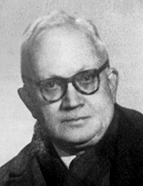

A student at the École Normale Supérieure, Agregé des Lettres in 1920, he was a lecturer at the Faculdade de Letras de Lisboa [ School of Arts and Humanities of Lisbon ] from 1920 to 1922 and then worked in Madrid (École des Hautes Études Hispaniques) from 1922 to 1927. He devoted himself in particular to the history of the Church, having defended a remarkable doctoral thesis in Paris on the evangelisation of Mexico by the mendicant orders in 1932, under the direction of Henri Hauser and Marcel Mauss. He was a high school teacher in Rabat and later a professor at the University of Algiers, a senior official in Morocco (Director of Public Education), he was appointed to the Chair of Hispanic Studies at the University of Paris (Sorbonne) in 1946. He directed the Institut Hispanique and held the position of Directeur d'Études at the 4th section of the École Pratique des Hautes Études. He also devoted himself to Arabic studies, and after the death of Henry de Castries, he worked with Pierre de Cénival and David Lopes in editing the Portuguese section of the Sources Inédites de l'Histoire du Maroc — for which he was ultimately responsible. He was a member of the Editorial Committee of the Bulletin Hispanique from 1947 until 1981 (which he chaired from 1977 to 1981), and then served as President of Honour of that Committee of a magazine to which he collaborated extensively. He also contributed to the Bulletin des Études Portugaises, published by the French Institute in Lisbon. In addition to the Arquivos do Centro Cultural Português da Fundação Calouste Gulbenkian [Archives of the Portuguese Cultural Centre of the Calouste Gulbenkian Foundation] in Paris. He was also a regular contributor to magazines published by Catholic institutions, particularly those linked to the Society of Jesus.
As a scholar with a sure grasp of philological research, he published articles of great subtlety and depth on terms and concepts, refining meanings that were often forgotten or remained hidden: as in the case of rossio and devezas and terreiro do paço or the eixido or the toques das trindades or the meaning of couraça — as well as other lexicographical studies of his choice. With these works he proposed and solved problems of toponymy, both Portuguese and Spanish, with great critical finesse. Many of his writings are scattered and difficult to access, and would merit a publication that would allow them to be studied together — and there are many of them, scattered throughout magazines that sometimes have a very small circulation: Robert Ricard was generous in distributing his wisdom. With the exception that, in 1955, the University of Coimbra organised a collection of his articles on the history of the Portuguese in Morocco , and in 1970 there was a similar effort by the Calouste Gulbenkian Foundation in Paris, that gathered other writings on the moral and religious history of Portugal. These are two indispensable volumes for scholars of Portuguese culture and politics — and essential for all scholars.
This work is financed by national funds through FCT - Foundation for Science and Technology, I.P, in the scope of the projects UIDB/04311/2020 and UIDP/04311/2020.
